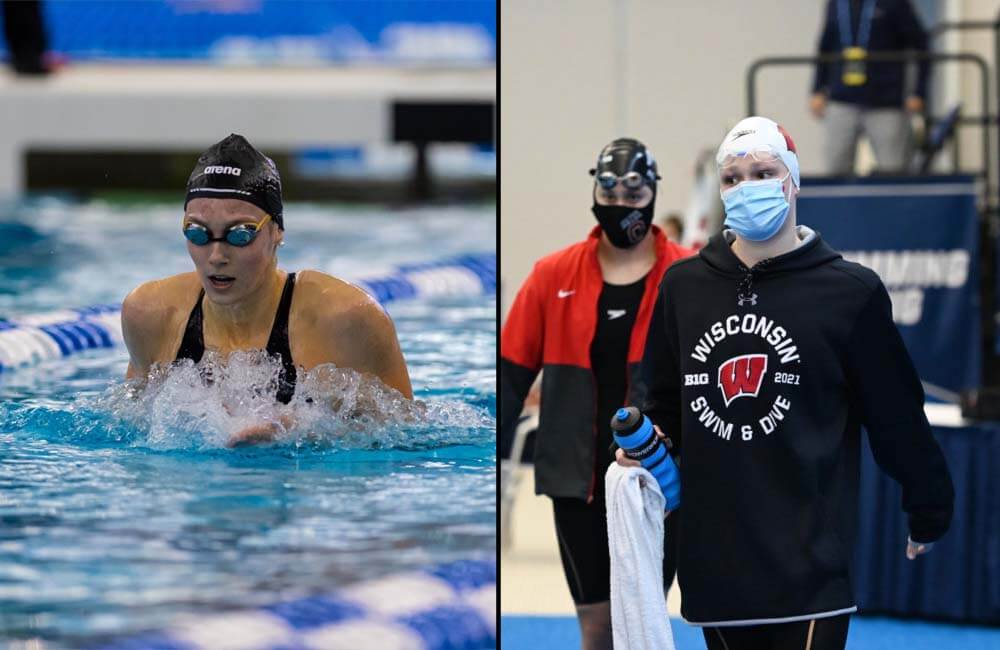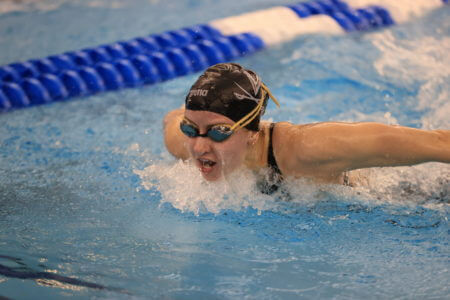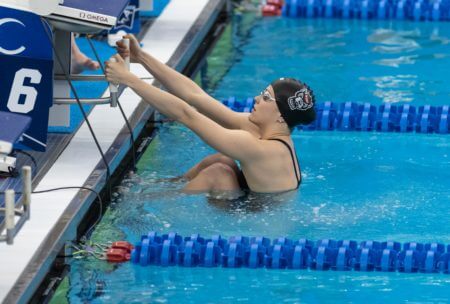NCAA Women’s Championships: Youth Movement Sets the Bar High

Freshmen & Sophomores Set the Bar at Women’s NCAA Championships
While this year’s NCAA championships saw a massive (but expected) shift in the team competition, with ACC teams Virginia and NC State finishing first and second after the conference had never previously had a team finish higher than third, there was a bit more literal of a changing of the guard. Of all the women competing, half were at NCAAs for the first time. In 2020, the NCAA swimming championships were among the first cancellations of the COVID-19 pandemic, so last year’s freshmen never got their chance to see how they stacked up against the returning best.
At meet’s end, two of those sophomores, Kate Douglass and Katharine Berkoff, are individual national champions, with plenty more to offer, and two freshmen, Alex Walsh and Phoebe Bacon, won individual titles of their own. That quartet led the way for a large group of young talent that put together a string of impressive performances across the four days, including nine others who finished among the top three in individual events.
“I am really lucky that my class of girls are a really deep group,” Walsh said. “I am excited to race girls like Phoebe Bacon and Isabelle Stadden for the next three years. We all went to different colleges, and that makes the NCAA meet that much more exciting and fun to be a part of.”
Bacon added, “It really shows the freshmen class I’m in and the classes coming up, this meet is going to keep getting faster and faster.”
This whole group will be back for at least two more years, and even though women’s swimming has trended older in recent years as many of the country’s best have moved from collegiate swimming into the professional ranks, don’t be surprised to see some of these women making an impact in long course during the Olympic summer.
Super-Versatile Kate Douglass and Alex Walsh Lead Virginia
No one should be surprised that both Douglass and Walsh won national titles this week—but if anything, their NCAA performances might have not been fully indicative of how talented and impressive both swimmers are.
Since she arrived at Virginia in the fall of 2019, Douglass has been the class of college swimming in the 200 IM. She had the country’s top time last season (1:51.36) and she swam a 1:50.92 in November that made her the third-fastest performer of all time. And yet, Douglass didn’t swim the event this week in Greensboro. After Walsh edged her out at the ACC championships, the Virginia coaches decided to move Douglass out of the event for NCAAs.

Virginia’s Kate Douglass swimming butterfly at the women’s NCAA championships — Photo Courtesy: Carlos Morales
The move paid off. On Thursday, Walsh, who ranks fifth all-time in 1:51.53, easily won the NCAA title, while Douglass won the very next event, the 50 free. So the Douglass was on sprint duty for the whole meet, and she ended up adding two runner-up finishes behind the likes of world champion Maggie MacNeil. She now ranks third all-time in the 50 free, sixth in the 100 fly and tied for seventh in the 100 free.
And oh yeah, Douglass also has a 2:03.93 in the 200 breast to her name, and that time from last month would have placed her second to Sophie Hansson in the 200 breast in Greensboro by just seven hundredths. Instead, Virginia went with another sophomore, Ella Nelson, who placed second in the 200 breast, while Walsh placed fifth.
As for Walsh, despite her national title early in the meet, she did not swim at her absolute best this week, as she settled for fifth in the 200 free in addition to her fifth-place finish in the 200 breast. She, too, had options for her event schedule. In long course, she is the reigning Pan American Games champion in both the 200 IM and 200 back. Yes, backstroke. The freshman who swam the 200 IM, 200 free and 200 breast at the NCAA championships actually made her name first as a backstroker, and in long course, she currently ranks 11th all-time among Americans in the 200 back.
So in this duo, Virginia has two swimmers who can basically do anything. No one is second-guessing head coach Todd DeSorbo’s event strategy, not when the Cavaliers just won a national championship by a whopping 137 points. It’s just that as good as Douglass and Walsh were in Greensboro, they are really even better.
Meanwhile, it’s an Olympic year, so it would be remiss to not consider the long course implications. Walsh currently ranks third among Olympic Trials qualifiers in the 200 IM, with having swum a 2:09.01 at the U.S. Open in December 2019. That should put her right in the thick of a tight field that will also include Kathleen Baker, Melanie Margalis, Madisyn Cox and Ella Eastin. She could also be an outside contender in the 200 back.
Douglass? That’s harder to pinpoint. Her strongest lifetime bests in long course include a 57.43 in the 100 fly, 2:12.11 in the 200 IM and 24.99 in the 50 free. The fly time, in particular, is strong, but a crowd of impressive high schoolers led by Claire Curzan along with the experienced Kelsi Dahlia has raised the bar in that event. Certainly, she has yet to show her full long course potential, and she will have her chance in a few months.
Katharine Berkoff and Phoebe Bacon Make Backstroke Statements
Like Douglass, Berkoff missed out on her first NCAA championships in 2020, but she was not yet a national title favorite. In her first backstroke NCAA final, the NC State sophomore delivered a championship effort, a 49.74 that made her the fourth-fastest performer ever. A day later, Bacon came out on top in the 200 back, with her 1:48.32 vaulting her to eighth all-time.

Katharine Berkoff at the start of a backstroke race — Photo Courtesy: NCAA Media
Two very impressive swims that would normally set the standard for backstroke heading into an Olympic Trials—except that both are already faces in perhaps the most crowded, most competitive events in the country.
Currently, Regan Smith is the world record-holder in both long course events, the American record-holder in both short course events and the favorite for Olympic gold. In the 100 back, the American rankings consist of Smith, followed by former world record-holder Baker, then Bacon and then 2016 Olympian Olivia Smoliga, all under 59. Fifth in the rankings is Berkoff, who will still receive almost no attention despite a long course lifetime best of 59.29 and her impressive efforts on the college level. Such is the state of women’s backstroke in the U.S.
As for the 200 back, Smith and Baker have been considered the top contenders, with Lisa Bratton, Stadden (third at the NCAA championships in an impressive 1:49.66, Walsh and Hali Flickinger making up the next group. But Bacon has steadily improved in the longer race in recent years. She swam a long course time of 2:08.82 in December of 2019, but her short course times in Greensboro between prelims and finals marked a drop of almost 2.5 seconds.
Before the meet, Bacon told Swimming World that she had been looking forward to showing off her improvement in the 200 back, so while most of the attention on Bacon’s Olympic hopes largely is on her 100 back, her NCAA win shows it’s worth keeping an eye on her prowess in the longer distance as well.
Best of the Rest at NCAA Championships
Other swimmers in their first or second year finishing among the top three in Greensboro included Virginia’s Nelson in the 400 IM and 200 breast, Cal’s Stadden in the 200 back, Georgia’s Zoie Hartman in the 200 IM, Kentucky’s Lauren Poole in the 400 IM, Florida’s Talia Bates and Texas’ Kelly Pash in the 200 free, USC’s Kaitlyn Dobler in the 100 breast, Tennessee’s Mona McSharry in the 200 breast and Texas’ Olivia Bray in the 200 fly.
Of that group, particular credit should go to Bray and Texas teammates Pash and Emma Sticklen (another freshman), who finished second, tied for fourth and seventh, respectively, in the 200 fly, to keep the Longhorns alive in the race for team runner-up. Bray took the race out hard and led through the first 100 yards before doing enough to hang on for second.
Expect to hear from all of these swimmers again in the coming months and years, but in the immediate future, the one most likely to qualify for the Tokyo Olympics is McSharry, already an Irish national record-holder who impressed in her first year on Rocky Top. Among Americans, the best chance out of this group would come from 200 freestylers, with six swimmers set to be selected for relay purposes, but neither Bates nor Pash has recorded any notable times in sparse long course racing opportunities in recent years.




